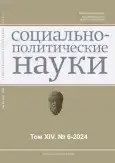The culture of communication between representatives of different nations in Russian society and ways to improve it
- Authors: Shevtsov V.M.1, Kravchenko V.V.1, Novoselsky S.O.1
-
Affiliations:
- Zhirinovsky University of World Civilizations
- Issue: Vol 14, No 6 (2024)
- Pages: 73-80
- Section: Political Institutions, Processes and Technologies
- URL: https://journal-vniispk.ru/2223-0092/article/view/284293
- DOI: https://doi.org/10.33693/2223-0092-2024-14-6-73-80
- EDN: https://elibrary.ru/DNOIOJ
- ID: 284293
Cite item
Abstract
The article is devoted to the consideration of the culture of communication between representatives of different nations and the main directions for its improvement. In the current situation of geopolitical tension, when the opposing sides actively use hybrid pressure tools, it is important to ensure a balance of interests of all nationalities living in the socio-economic space of Russia. Since ancient times, Russian society has been multinational in nature, based on feelings of respect for the interests of other nationalities. Thus, at the civilizational level, the Russian people strive not to colonize representatives of other nations, but to find common ground with them for support and joint solution of a huge number of problems. Today, unfriendly countries are trying to disunite Russian society along national lines in order to inflict a strategic defeat on our country. An important element of the defensive response to various forms of hybrid aggression is the construction of a high-quality culture of communications between different nations. A positive factor for the successful solution of this problem is the existence of a common basis in the form of the Russian language, which generates an accessible bridge of communications. The replication of effective practices of intercultural communications significantly reduces the risks of ethnopolitical conflicts and leads to the stabilization of the social situation. Political elites, within the framework of their activities and public agenda, should actively engage in this process and in every possible way contribute to the expansion of the potential of intercultural communications. In the context of digital transformation, it is advisable to create new cultural spaces for interethnic dialogue in order to achieve political consensus in solving problematic issues of social, religious and economic nature.
Full Text
##article.viewOnOriginalSite##About the authors
Valery M. Shevtsov
Zhirinovsky University of World Civilizations
Author for correspondence.
Email: v.m.shevtsov@uwc-i.ru
SPIN-code: 1904-5409
Dr. Sci. (Philos.), Professor, advisor to the Rector
Russian Federation, MoscowVictoria V. Kravchenko
Zhirinovsky University of World Civilizations
Email: vickra@mail.ru
SPIN-code: 1823-2410
Dr. Sci. (Philos.), Professor; leading researcher, Department of World Politics and Intercivilizational Development
Russian Federation, MoscowSvyatoslav O. Novoselsky
Zhirinovsky University of World Civilizations
Email: nsvyatoslav@yandex.ru
Cand. Sci. (Econ.), Associate Professor, Professor of the Russian Academy of Natural Sciences, leading researcher, Scientific Center for the Study of the History and Development of World Civilizations
Russian Federation, MoscowReferences
- Bulavina M.A., Novoselsky S.O. Prospects for Russia’s military security in the existing geopolitical environment. In: Interstate confrontation in the context of globalization and its impact on the management of the national defense of the Russian Federation. Moscow, 2023. Pp. 105–112.
- Gantamirov T.T. Interethnic and interfaith dialogue in modern Russia: Problems and prospects. New Science: Experience, Traditions, Innovations. 2016. No. 3-2 (71). Pp. 127–129. (In Rus.)
- Guzikova M.O., Fofanova P.Yu. Fundamentals of the theory of intercultural communication. Textbook. Yekaterinburg: Publishing House of the Ural University, 2015. 124 p.
- Erokhina E.A. Ethnic diversity in the dynamics of the development of Russian Civilization. Ideas and Ideals. 2017. Vol. 2. No. 1 (31). Pp. 25–34. (In Rus.)
- Kashkin V.B. Great Russian Encyclopedia. Moscow: Great Russian Encyclopedia, 2004–2007. 937 p.
- Krysko V.G. Ethnopsychological Dictionary. Moscow: Moscow Psychological and Social University, 1999. 343 p.
- Lasaria A.O. Modern theoretical and methodological approaches to the settlement of ethnopolitical conflicts. In: Electronic Bulletin. Moscow: Moscow State University, 2017. Issue 63. 210 p.
- Loparev A.V., Yatsenko I.A. Ethnopolitical processes in Russia and the problem of global diasporization of the world. Power. 2011. No. 3. Pp. 119–123. (In Rus.)
- Novoselsky S.O., Moiseeva O.A., Filippova O.A. Communication policy of executive authorities with the population in social networks. Questions of Political Science. 2023. Vol. 13. No. 3 (91). Pp. 1001–1013. (In Rus.)
- Serova I.I. Culture of interethnic communication. Minsk: University, 2021. Issue 3. Pp. 12–13.
- Sukhanov K.A. National minorities of the Russian Federation – who are they? Proceedings of the Institute of State and Law of the Russian Academy of Sciences. 2022. Vol. 17. No. 4. Pp. 205–227. (In Rus.)
- Shevtsov V.M. National relations and military potential of the state (on the example of Russia). Monograph. 2nd ed. Moscow: VU, 2013. 253 p.
- Shevtsov V.M. Ethnopolitical conflicts: mechanisms for their settlement. Textbook. Moscow: UMC, 2024. 80 p.
- Shukshin V.S., Suvorov V.L. Hybrid wars of the modern era as a threat to Russia’s security. Monograph. Moscow: At the Nikitsky Gate, 2022. 336 p.
- Yushmanov P.N. Protection of the rights of national minorities in the Russian Federation: Problems and solutions. Sociology and Law. 2016. No. 2 (32). Pp. 112–116.
Supplementary files








